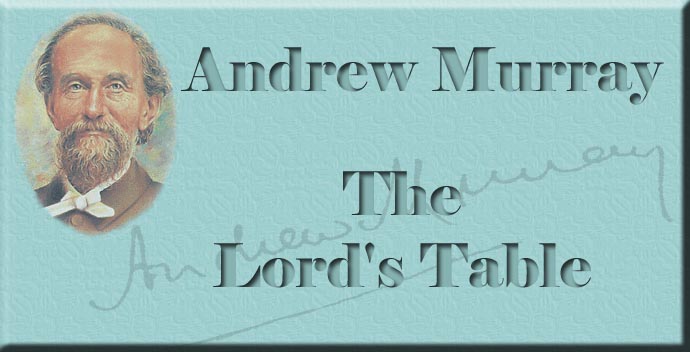
The Lord's Table
By Andrew Murray
Part 1 - Chapter 7
SATURDAY MORNING
Self-Surrender
"The love of Christ constraineth us; because we thus judge that one died for all, therefore all died: and He died for all, that they which live shall no longer live unto themselves, but unto Him who for their sake died, and rose again." –2 Cor. 5:14-15.
 n
the third place, let everyone
examine his heart to see whether
He is conscious of having
heretofore manifested genuine
thankfulness toward God with his
whole life." So the Directory
expresses what Must Constitute
the third part of
self-examination, whether I have
been hitherto conscious of
dedicating myself to the Lord as
a living thank offering, not in
single things only, but in my
whole life. n
the third place, let everyone
examine his heart to see whether
He is conscious of having
heretofore manifested genuine
thankfulness toward God with his
whole life." So the Directory
expresses what Must Constitute
the third part of
self-examination, whether I have
been hitherto conscious of
dedicating myself to the Lord as
a living thank offering, not in
single things only, but in my
whole life.This is what Jesus desires. Every redeemed soul must be a man consecrated to God, entirely separated to live for Him, His will, His work, His honor. This also is what the true Christian desires: he acknowledges the equity of the demand which Jesus makes, the perfect right which Jesus has to him as His blood-bought possession. This is what the true Christian expects in the power of the love of Christ shed abroad in the heart, in the strength of the new life. And this dedication, this complete surrender, is what the believer especially confesses and completes in the Lord's Supper. The Lord's Supper is always a sacrificial repast, and that in a double sense. Under the Old Covenant there were special sacrifices–namely, the sin offering, the burnt offering, and the thank offering. The sin offering, by which atonement was made, was the type of the sacrifice of Christ alone. "He was made sin for us." The burnt offering, which had to be wholly consumed by fire on the altar, as a symbol of entire devotedness to the service of God, was the type alike of the sacrifice of Christ and of the sacrifice of believers in which they surrender themselves to the Lord (Rom. 12:1). Then last, the idea of thank offering is exhibited more fully to the apprehension in the feast of thank offering and in the fellowship that ensued. Of the sin offering, by which atonement was made, the priests might eat, as a token of their fellowship with God through the atonement. The Lord's Supper is our fellowship in the perfect sacrifice of Jesus Christ which has done away with sin forever. Of the thank offering in which dedication to God was shown forth, the offerer himself might also eat in recognition of his fellowship with God in this dedication. The Lord's Supper is a communion with Christ, not only because He offered Himself up for us, but because in and with Him we offer ourselves to the Father with all that we have. Marvelous union: Jesus offers Himself to me: I offer myself to Him: Jesus gives Himself wholly for me: I give myself wholly for Him. My sacrifice is the counterpart, the reflection, of His. With what earnestness did He prepare Himself for the fulfillment of His sacrifice, in order that His will might really yield itself completely and wholly to the Father. As for me, how much more need have I of preparation for asking whether, while I take a whole Christ for myself, I yield myself with my whole life to Him. "Let every one examine his heart." Believer, the observance of the Supper is a glorious opportunity of renewed dedication to your Lord. Let the Holy Spirit discover to you what it is to be a decided Christian: undividingly, unceasingly surrendered to Jesus in heart and hand and lips, at home and in society; living for Jesus, working zealously for Jesus; a burnt offering which is given entirely for God, and is consumed by the fire of the Spirit. In this spirit, prepare yourself to be willingly bound to the horns of the altar.
|
|
 |
 |
PRAYER.My Father, Thou callest me to Thy table to participate by faith anew in
the sacrifice of Thy Son: I cry to Thee, in turn, to make me partaker of
the power, the inclination, and the spirit of His self-sacrifice, that
I, in fellowship with Him, may in like manner offer myself up to Thee.
"Through the Eternal Spirit He offered Himself up to God." My God, let
the same Spirit make me also, on my part, a complete offering to Thee.
|
|
-
Site Navigation
 Home
Home What's New
What's New Bible
Bible Photos
Photos Hiking
Hiking E-Books
E-Books Genealogy
Genealogy Profile
Free Plug-ins You May Need
Profile
Free Plug-ins You May Need
 Get
Java
Get
Java.png) Get Flash
Get Flash Get
7-Zip
Get
7-Zip Get Acrobat Reader
Get Acrobat Reader Get
TheWORD
Get
TheWORD